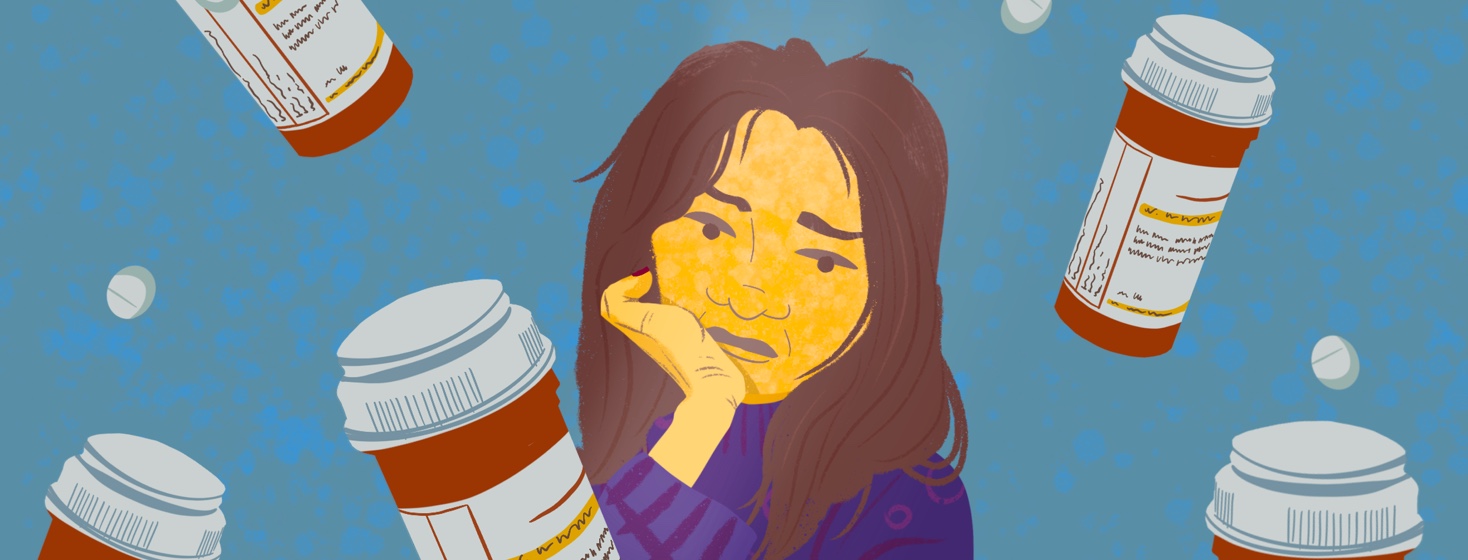Long-Term Side Effects?
It’s tough getting older, but definitely better than the alternative! While I am incredibly grateful for the advances in research that are allowing me to live well with stage IV lung cancer and keep aging, I’m still human and not completely thrilled about some of the changes my body is going through. I’ve written about a number of these in previous articles — weight gain, thyroid changes, and tooth decay — but it’s unclear whether these issues are due to advancing in age or related to my over seven years of continuous targeted therapy treatment for EGFR positive lung cancer.
Cataracts in both of my eyes
As of my recent visit to my eye doctor, I appear to have one more issue to add to the list! I seem to be developing cataracts in both of my eyes. While not unusual, cataracts are more often seen in people older than I am. Due to COVID, I skipped my annual eye doctor exam last year, so it had been two years since my last appointment with my eye doctor. He looked back over my charts and results from 2019, and couldn’t find any indication of previous cataract development, so this has happened in the past two years.
What are cataracts?
What are cataracts? According to the Mayo Clinic, “A cataract is a clouding of the normally clear lens of your eye. For people who have cataracts, seeing through cloudy lenses is a bit like looking through a frosty or fogged-up window. Clouded vision caused by cataracts can make it more difficult to read, drive a car (especially at night) or see the expression on a friend's face.”1 I’ve noticed that it’s more difficult for me to see at night, especially when driving. I often see “a halo around lights” as well, which is another hallmark of cataract development. To learn more about cataract diagnosis and treatment, the NIH Eye Institute has a great site.
It’s certainly not that difficult to treat cataracts. My eye doctor estimates that it will likely be a few years before my vision is impacted enough to need surgery, and cataract surgery is considered very safe and standard. I might even be able to stop wearing contact lenses and glasses post-surgery, as I can have vision correction done at the same time! In the meantime, he recommended that I wear sunglasses to protect my eyes when I’m outside.
Possible side effect of targeted therapy
Why do I think this might be the result of my targeted therapy treatment? Well, one of the side effects of my current oral medication is “eye problems.” I went through the product literature and found a footnote that explained that the eye problems which occurred in patients during clinical trial experience: “includes dry eye, vision blurred, keratitis, cataract, eye irritation, blepharitis, eye pain, lacrimation increased, vitreous floaters. Other ocular toxicities occurred in <1% of patients.”2 I had none of these eye issues earlier in treatment, fortunately, but little is known about the long-term side effects of targeted therapy.
We need to better understand long-term side effects
Don’t get me wrong, I consider myself fortunate to be alive to even experience these issues! However, now that patients are living with lung cancer longer than ever before in history, I think it’s important to categorize and study the long-term side effects that are experienced. I did a Google search on long-term side effects of EGFR TKIs and the only article I found was from 2010. It addressed “long term” use of erlotinib (Tarceva), but all patients in the study who had taken this medication for more than 6 months were considered long term users.3 The lung cancer landscape has changed significantly since 2010, with numerous new drug approvals and clinical trials.
I think it is critically important to study the long-term side effects experienced by our current patients. Healthcare providers need to understand what these impacts could be and how to treat them effectively. Patients need to be mentally prepared for the possibility of certain long-term issues and understand that they are not the only ones experiencing such problems. Maybe with increased knowledge, there could even be ways to prevent or reduce certain long-term side effects before they occur.
What about you?
In the meantime, feel free to share if you experience a side effect that you believe is due to long-term usage of targeted therapy. Let’s start a conversation about this!
Editor’s Note: We are extremely saddened to say that on June 23, 2024, Ivy Elkins passed away. Ivy’s advocacy efforts and writing continue to reach many. She will be deeply missed.

Join the conversation